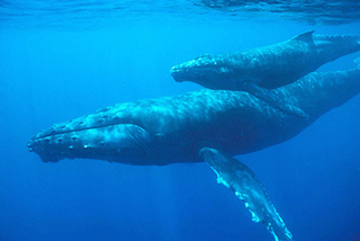401613-sounding off.jpg

Humpback whales are known as "summer" whales. Credit: National Oceanic and Atmospheric Administration, Doug Perrine
Like relatives who linger a little too long after the holidays, some species of whales are taking their time about leaving Arctic waters in the fall. And that could set up some unpleasant competition with other species for the goodies in the fridge.
Researchers at the University of Washington have been keeping an “ear” on whales and other marine mammals in the straits between the Arctic and northern Pacific oceans. They’ve set up a network of underwater microphones that record sounds for months at a time. The researchers retrieve the recordings and listen for the clicks, whistles, and songs of different species. Sound is a good way to monitor migrations because it can travel long distances, and it can be recorded all year long — even when conditions are too brutal to watch these animals.
Some whales are known as “summer” species because they visit the Arctic during the year’s warmer months. That includes humpback, fin, and killer whales. Other whales, such as the bowhead, are “winter” species — they inhabit the Arctic during the cold, dark months of winter.
Over the last few decades, though, as the oceans have warmed, parts of the Arctic have remained ice-free for several more weeks or even months. The underwater recordings reveal that the summer species are taking advantage of that time, lingering in the Arctic well into fall.
And that could present a problem. When the summer species stick around, they compete with the winter species for food — extra mouths to feed from the Arctic fridge.

